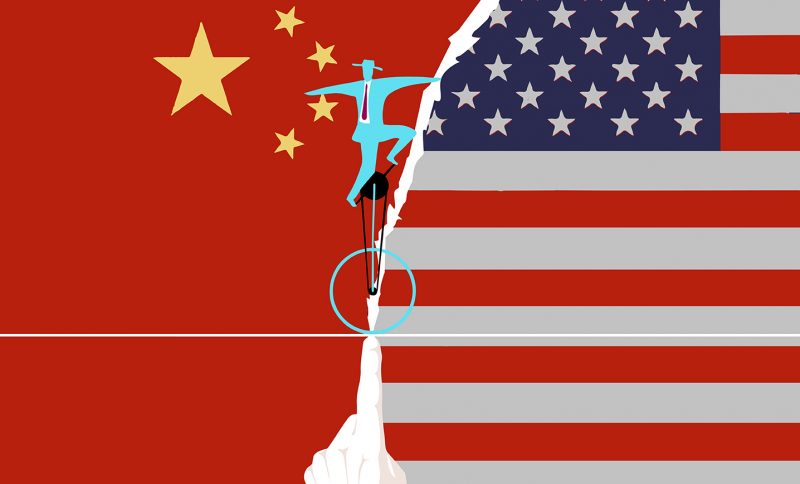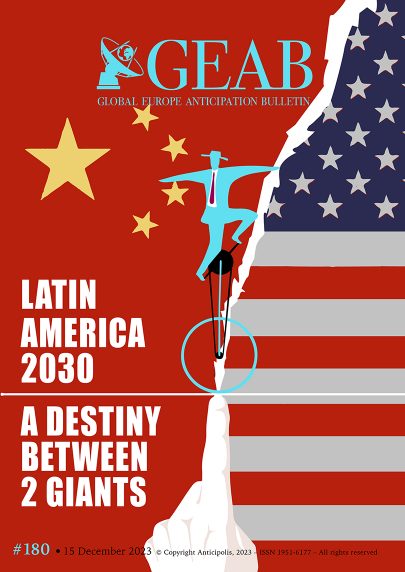GEAB 180

Similar to the gradual movement of continents, the reshaping of the global order is a protracted and gradual phenomenon when examined on a monthly scale. While marked by intense clashes that give rise to mountain ranges and definitive separations resulting in straits, seas, or oceans, geopolitical plate tectonics unfolds over an extended period.
Between the United States and China, key players in this emerging order, some have already aligned themselves and have limited flexibility to alter their stance. However, it is crucial not to overlook regions where alliances and connections are yet to be established. These are the areas we have chosen to emphasize in this publication.
The most substantial among these regions is Latin America. Traditionally regarded as the United States’ backyard and more recently subject to China’s active influence strategy, it currently navigates a delicate balance—sometimes attempting to carve out a more independent path, as seen in the case of Brazil, or teetering towards one side or the other. The election of the Americanist libertarian Javier Milei in Argentina, slated to join the BRICS by year-end, exemplifies this ongoing power play, expected to intensify in the years ahead. China continues to assert its influence, not only through the appeal of the BRICS but also through substantial investments in infrastructure, primarily via the New Silk Roads initiatives. Meanwhile, the United States, prompted by diminished global projection capabilities, perceives the retreat of its influence to its regional sphere as not merely a political choice but a necessity—a trend initiated by Trump. These dual trajectories underscore that Latin America is evolving into the focal point of the economic showdown between these two major powers.
Another dynamic aspect in the plate tectonics of the global order is observed in the South Caucasus. The escalation of tensions between Armenia and Azerbaijan over Nagorno-Karabakh in September transitioned into a collaborative and peaceful joint declaration in early December. Notably, this diplomatic negotiation took place directly between the two disputing parties, without the involvement of intermediaries. This development signals significant strides in diplomatic relations between the two countries, especially given the active involvement of various regional powers in the ongoing conflict. It reinforces our anticipation that barriers to peace are gradually yielding to a form of stabilisation, albeit accompanied by intense upheavals. The continent that is least likely to go off course remains Europe, as shown by our assessment of anticipations for 2023 (with a score of 82.43%). Europe is fading away in this new multipolar world, without too many visible shocks for the moment, but the reality is undeniable and will be felt sooner rather than later. The United States, on the other hand, is managing to control this drift by clinging on to its multipolar strongholds, even if this involves conflictual relations.
Here’s an updated version of our global map as we approach the year’s end, providing you with a fresh perspective. We extend an invitation for you to join us in looking ahead to 2024. The upcoming year will commemorate the 35th anniversary of the fall of the Berlin Wall. Taking a retrospective view from 2023 to 1989, we have compiled a list of 35 key events in the global systemic transition. Now, in a survey, we invite you to speculate on the event that will define the year 2024. We will be sharing our insights with you during a special online event on January 11, 2024.
As we send our warmest wishes for the approaching New Year, we hope you find joy in reading this newsletter and wish you a delightful festive season.
To read the articles of this Issue, subscribe here.

By January 1st, 2024, Argentina was expected to become a member of the BRICS bloc, alongside Iran, Egypt, Ethiopia, Saudi Arabia, and the United Arab Emirates. However, Milei's election as [...]
We are witnessing an era of historical cynicism that compels us to perceive a succession of micro-conflicts, accompanied by their toll of casualties and population displacements, as endeavors aimed at [...]
Last January, in our issue GEAB 171, by way of presenting a panorama of trends and anticipations point by point as we used to do, we chose to paint a [...]
Poll: In 2024, what will be the key event in the global systemic crisis? This year, our team would like to involve you in this survey. Send us your answer [...]
Hydrogen, a short-term opportunist The world's largest deposit of white hydrogen has apparently been discovered in France, by mistake... Although we are not contradicting our recent recommendations on "new energy" [...]

Comments